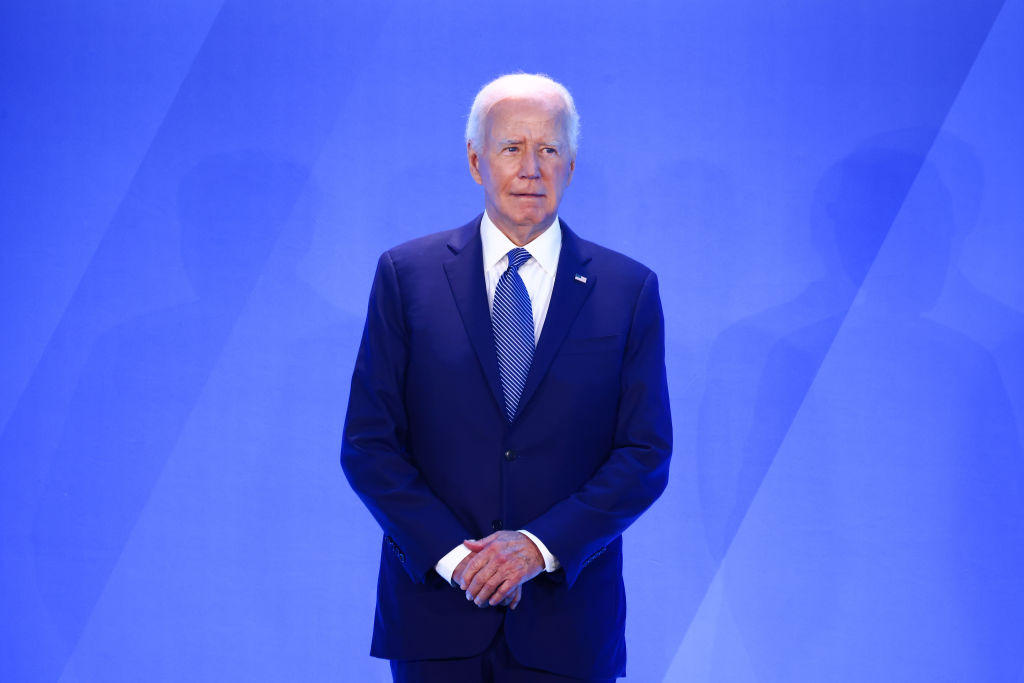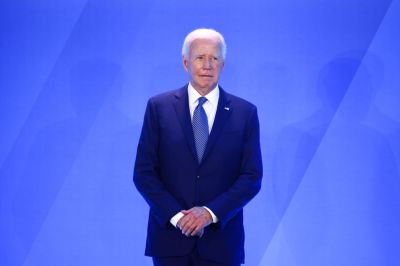Happy Thursday! The demise of physical video rentals seems almost complete: Redbox—the DVD vending machine company—is no more, lawyers for its parent organization said Wednesday.
The visual landscape of the suburban strip mall has forever lost some of its charm.
Quick Hits: Today’s Top Stories
- President Joe Biden continued to face concerns from Democratic lawmakers about continuing his reelection campaign on Wednesday. In a Washington Post op-ed published Wednesday evening, Sen. Peter Welch of Vermont became the first Democratic senator to call on the president to step aside. Though he’s been supportive of the president publicly, Axios also reported Wednesday that Senate Majority Leader Chuck Schumer is privately open to replacing Biden on the ticket. In another op-ed, this one for the New York Times, actor George Clooney—a major donor and fundraiser for the president—likewise said Biden should not continue his reelection bid despite Clooney having recently held an event for him last month. Clooney asserted Biden’s mental acuity was obviously diminished at that event. Meanwhile, NBC News announced Wednesday that Biden would sit for an interview on Monday with anchor Lester Holt, the president’s second prime-time interview since his dismal debate performance two weeks ago. The interview won’t air live, but NBC News said it plans to publish the full conversation and an unedited transcript on its website.
- At the 75th NATO Summit in Washington, D.C., this week, the defensive alliance’s 32 members affirmed that Ukraine is on an “irreversible” track toward membership but did not outline a concrete timeline for the country’s accession. NATO Secretary General Jens Stoltenberg also announced that the alliance will take over coordinating and provisioning the lion’s share of military aid to Ukraine from the alliance’s members, including setting up a new NATO command in Germany to train and equip Ukrainian soldiers. Members of the consensus-based alliance were unable to reach an agreement for a multi-year funding scheme that Stoltenberg sought but promised to provide a combined 40 billion euros to Ukraine in the coming year. In the official communiqué from the summit, the alliance’s members also declared that China is a “decisive enabler” of Russia’s war in Ukraine—its strongest language yet to describe Beijing’s support of Russian President Vladimir Putin’s war.
- CIA Director William Burns met with the Qatari prime minister and Israeli and Egyptian intelligence officials in Doha, Qatar, on Wednesday to resolve the remaining disagreements over a ceasefire agreement between Israel and Hamas. U.S. and Israeli officials are optimistic about reaching a deal soon, Axios reported yesterday, which would pave the way for a ceasefire in exchange for the remaining Hamas-held hostages and see Israel release some Palestinian prisoners. Meanwhile, Brett McGurk, the Biden administration’s top adviser on Middle East policy, traveled to Israel for a meeting with Israeli Prime Minister Benjamin Netanyahu, who said in a statement that he had told McGurk he was open to a deal as long as Israel’s “red lines” were preserved. Netanyahu has maintained that Israel wants to fully defeat Hamas militarily.
- The Biden administration announced additional tariffs on steel from Mexico on Wednesday with the aim of closing a loophole that had allowed Chinese companies to work around existing U.S. tariffs by sending steel through Mexico. The new tariffs would impose a 25 percent duty on steel that was melted or poured outside of North America. Likewise, Mexican aluminum that was melted or poured in China, Russia, Iran, or Belarus will be subject to a tariff of 10 percent.
- President Biden announced a federal emergency disaster declaration for Texas on Wednesday following tropical storm Beryl’s landfall in the state earlier this week, which left approximately 1.7 million people without power—increasing the likelihood of heat-related illnesses as the heat index for the Houston area tops 100 degrees. Biden said the federal government planned to move additional generators into the area to power air conditioners.
More Dominoes Fall

As Jonah and Nick have written repeatedly in recent months, this is a “vibes” election. And never have the vibes been more all over the place than in the days since President Joe Biden’s disastrous June 27 debate performance.
In the days after we last wrote to you about the Democratic Party’s angst over Biden’s age and mental acuity, Biden’s odds of renomination—which had been trending downward—seemed to improve slightly. The president went on the offensive and Democrats’ push—publicly and privately—to convince Biden to step aside began to lose some of its “oomph.”
But the vibes have once again shifted, with plenty of Democratic dominoes falling in the last 24 hours—and even more teetering. Two weeks after the debate, just more than a month out from the Democratic National Convention, and 116 days away from the election, there is still deep uncertainty about the president’s future—despite Biden’s own assertions that he’s not going anywhere.
The president started the week in defiance, pushing back on growing Democratic unease with his candidacy. On Monday morning, Biden called into one of his favorite cable shows, MSNBC’s Morning Joe, in a move that may feel rather familiar. “I’m not going anywhere,” he declared. He railed against “the elites” in his party and the media who have come out against him—echoing advice host Joe Scarborough tweeted just a day earlier—and dared his critics to try and stop him from running. “Any of these guys that don’t think I should run, run against me,” he said. “Announce for president, challenge me at the convention.”
The Morning Joe appearance came in conjunction with a letter the president shared with Democratic members of Congress on Monday morning, arguing that dropping out would be undemocratic. “The voters of the Democratic party have voted,” he wrote. “Do we now just say that process didn’t matter? That the voters don’t have a say?”
The president’s camp received good news on Monday and Tuesday, too, gaining the backing of black congressional leaders. Democratic Rep. Steven Horsford of Nevada, the chair of the Congressional Black Caucus, released a statement on Monday supporting the president’s candidacy. Plus, influential Democratic Rep. Jim Clyburn of South Carolina was likewise supportive of the president on Tuesday. “We’re ridin’ with Biden,” he said, emerging from a meeting of House Democrats.
The Biden campaign has leaned into the support of black lawmakers, even suggesting the president’s white critics risk alienating the Democratic base. “I think it’s interesting that not one African American member [of Congress] has called on the president to step down,” Cedric Richmond, a Biden campaign co-chair and former member of Congress, said on Sunday.
Other prominent Democrats lined up to voice their support for the president too. “The matter is closed,” progressive Rep. Alexandria Ocasio-Cortez of New York said Monday. “He’s in this race, and I support him.” During a press conference a day later, Senate Majority Leader Chuck Schumer simply said, “I’m with Joe.” Democratic Rep. Ritchie Torres, also of New York, objected to Democrats “piling-on” Biden. “Weakening a weakened nominee seems like a losing strategy for a presidential election,” he said.
But then came yesterday, when many of those same Democrats began singing a different tune. “I have no idea,” Clyburn said on Wednesday when asked if Biden’s decision to keep running is final. “You’ll have to ask him.” Torres, too, seemed to have reversed course from just a few days earlier, telling CNN, “If we are going on a political suicide mission, then we should at least be honest about it.”
Last night, Axios reported that Schumer is privately open to replacing Biden on the Democratic ticket, and that he’s been “listening to donors’ ideas and suggestions about the best way forward for the party.” The Senate majority leader initially didn’t provide a comment for the story, but later followed up with a statement that was notably crafted in the present tense: “As I have made clear repeatedly publicly and privately, I support President Biden and remain committed to ensuring Donald Trump is defeated in November.” Senate Democrats are scheduled to meet with Biden advisers and campaign leaders today.
Perhaps the surest sign of Democratic unease behind the scenes is that even those not explicitly calling for Biden to step aside are still treating it as an open question that needs to be answered, despite the president himself stating in no uncertain terms that he’s staying in. Asked if the president still has her support on Morning Joe on Wednesday, former House Speaker Nancy Pelosi demurred. “It’s up to the president to decide if he’s going to run,” she said. “We’re all encouraging him to make that decision because time is running short.” When reminded that Biden already has made that decision, Pelosi got cagey: “I want him to do whatever he decides to do.”
Although Biden’s push on Monday—the Morning Joe interview and the congressional letter—seemed to temporarily slow explicit Democratic opposition to his candidacy to a trickle, the resistance picked back up to a steady stream on Tuesday night and Wednesday. Nine Democratic House members have now publicly called for Biden to exit the race. Democratic Sens. Sherrod Brown and Jon Tester reportedly told their colleagues that they don’t think the president can win, and Sen. Michael Bennet told the world the same on CNN. Sen. Peter Welch of Vermont went a step further yesterday, becoming the first Democratic senator to explicitly call for the president to exit the race, writing in a Washington Post op-ed that Biden should withdraw “for the good of the country.”
It’s no secret why the shift is happening: Biden’s polling continues to weaken. The Cook Political Report updated its Electoral College ratings on Tuesday to move six states—including crucial battlegrounds, such as Nevada, Arizona, and Georgia—toward Trump’s column. Cook also released its new national polling average on Wednesday, which showed Trump running almost 3 points ahead of Biden after being tied ahead of the debate. Biden’s post-debate decline represents the largest polling shift this year.
Trump has also made consistent gains among voting blocs that were key to Biden’s 2020 victory. “Trump’s current numbers among black and Latino voters are incompatible with any plausible Democratic victory scenario,” concluded David Wasserman, a senior editor and elections analyst for Cook. Torres, the U.S. representative from New York, underscored the steep dip yesterday: “What matters is not how we feel but what the numbers tell us.”
And Torres wasn’t just talking about the presidential race, noting the “down-ballot effect of whomever we nominate.” In fact, Democratic lawmakers getting their own polling results back from the field probably explains the recent shift in their rhetoric as much as anything else, as those in competitive districts were some of the first to call for Biden’s exit after the debate. “What I said this morning and expressed to my colleagues, particularly for members on the frontline, I think they need to do whatever they need to do in order to come back and be reelected,” Rep. Marc Veasey, a Texas Democrat, said after leaving the Democratic House meeting Tuesday. “If they need to distance themselves, then that’s what they need to do.” Bennet, in his CNN comments on Tuesday, argued that Democrats could “lose the whole thing,” including the House and the Senate, with Biden at the top of the ticket.
The donor class is getting antsy, too. In a New York Times op-ed on Wednesday, George Clooney called on Biden to step aside, despite the actor being one of the president’s biggest supporters and even hosting a large Democratic fundraiser for him last month. “I consider him a friend, and I believe in him,” Clooney wrote. “But the one battle he cannot win is the fight against time. None of us can. It’s devastating to say it, but the Joe Biden I was with three weeks ago at the fundraiser was not the Joe ‘big F-ing deal’ Biden of 2010. He wasn’t even the Joe Biden of 2020. He was the same man we all witnessed at the debate.”
“This isn’t only my opinion,” he added. “This is the opinion of every senator and congress member and governor that I’ve spoken with in private. Every single one, irrespective of what he or she is saying publicly.” Jon Favreau, a former speechwriter for President Barack Obama who attended the fundraiser, told CNN yesterday that “every single person I talked to at the fundraiser thought the same thing.”
The defections—both public and private—are creating real logistical concerns for the Biden campaign ahead of next month’s Democratic National Convention in Chicago. According to Politico’s Jonathan Martin, Biden’s own team has resorted in recent days to calling individual delegates and attempting to tease out whether they’re planning to revolt. “Do you understand what being a pledged delegate means?” one delegate was reportedly asked by a campaign aide.
Such campaign aides are reportedly “despondent” as the path for Biden to remain in the race seems to narrow. Stories have begun to trickle out about how staffers reacted to Biden’s debate performance last month: One person at campaign headquarters in Wilmington, Delaware, reportedly stood up and laid down on the floor; another “blurted out, ‘Oh, thank God,’” when the debate’s video feed temporarily glitched.
Kevin Munoz, a spokesman for the campaign, tried his best to put on a brave face yesterday, saying in a statement that “we can either worry or we can work.”
But hard work won’t quell questions about the true nature of Biden’s publicly visible decline. After a heated White House press briefing Monday, the physician to the president, Dr. Kevin O’Connor, released a statement that night that said neurologist Dr. Kevin Cannard, an expert on Parkinson’s disease, has been the specialist examining the president at each of his annual physicals—the most recent of which was in January. (White House press secretary Karine Jean-Pierre had said earlier that day that Cannard’s visit to the White House was not related to care for the president.) The publicly released results of that exam did not indicate signs of any degenerative illness or disorder, but O’Connor did not explain whether Cannard’s other visits to the White House—eight in eight months—had anything to do with Biden’s health.
Biden tried to shoot down concerns about his mental acuity while on Morning Joe, but some of his responses may have had the opposite effect. “If there was something that was wrong that night, it’s not like it comes, that’s one night, and it goes away,” he said. “And that’s why I’ve been out—I’ve been testing myself.” The president will face another test this evening, when he is set to hold a press conference—his first since the debate—during the NATO summit in Washington. (A “big boy” press conference, as White House communication staff have bizarrely described it.)
Biden gave an impassioned speech at the opening of the NATO Summit on Tuesday. But aside from his Morning Joe call-in and his sit-down interview with ABC News’ George Stephanopoulos last week, he’s done little to attempt to assuage Democratic fears about his ability to speak off the cuff and deal with press scrutiny away from a teleprompter. Yesterday, it was announced Biden would sit for another interview on Monday, this time with NBC News’ Lester Holt.
But lawmakers remain skeptical that Biden’s debate performance and his Stephanopoulos interview were just bad episodes. “I will not vote for someone if I don’t think they are physically or mentally equipped to lead this nation,” Democratic Rep. Jared Golden of Maine said yesterday, after last week predicting that Biden would lose. “And I do not know the answer to that question at this time.”
Worth Your Time
- Writing for his Governing Right Substack, Andy Smarick explored the costs of alarmism. “We’re all familiar with the modern style of consuming political news: We seek out coverage and commentary we agree with, and that information makes us proud of our side and furious at others,” he wrote. “Since the other side is consuming information in the same way, we are driven apart and into comfortable, self-righteous bubbles. … From these bubbles emerges an intemperate, cruel profile that then invades the public square. … It is remarkable not just for its corrosiveness but for its immorality. It is the opposite of how we are taught to behave as we’re growing up. … The problem is today’s environment makes us believe that our bad behavior is justified.”
- In a monumental piece for The Atlantic, Tim Alberta takes a look inside the Trump campaign and its masterminds, Chris LaCivita and Susie Wiles. “In my conversations with LaCivita and Wiles over the past six months, they assured me multiple times that the campaign was planning for all contingencies, that they took quite seriously the possibility of a substitution and would be ready if Biden forfeited the nomination,” Alberta reported. “Biden quitting the race would necessitate a dramatic reset—not just for the Democratic Party, but for Trump’s campaign. Wiles and LaCivita told me that any Democratic replacement would inherit the president’s deficiencies; that whether it’s Vice President Kamala Harris or California Governor Gavin Newsom or anyone else, Trump’s blueprint for victory would remain essentially unchanged. But they know that’s not true. They know their campaign has been engineered in every way—from the voters they target to the viral memes they create—to defeat Biden. And privately, they are all but praying that he remains their opponent.”
Presented Without Comment
The Wrap: Biden Campaign Responds to George Clooney Op-Ed by Flexing Fundraiser Stamina, [Says] POTUS ‘Stayed for Over 3 Hours,’ Clooney Quickly Left
Also Presented Without Comment
GOP Rep. Tim Burchett, speaking to a reporter on Capitol Hill this week:
“I got to get in there, guys. Those post offices are not going to name themselves!”
Also Also Presented Without Comment
National Review: Harvard Reverses Suspensions for Five Anti-Israel Encampment Participants
In the Zeitgeist
The trailer for the Gladiator sequel stirred up quite the debate in Dispatch Slack, so we’ll put it to you: Are you Team “Grifting, Unnecessary Sequel” or Team “I’ll Watch Anything With Pedro Pascal In It”?
Toeing the Company Line
- On an extra special episode of Dispatch Live, Kevin will be joined by David French, and an all-star lineup of public intellectuals and Christian thinkers to explore the role of religion in modern conservatism. Members can tune into what is sure to be a fascinating conversation tonight at 7:30 p.m. ET and watch for an email with more details later today.
- In the newsletters: The Dispatch Politics team dug into the 2024 Republican party platform, Scott explored (🔒) the dynamics of the 2024 labor market, Jonah shot down (🔒) the idea of a massive coordinated media coverup of Biden’s infirmity, and Nick condemned (🔒) Democrats’ political cowardice as it relates to Biden.
- On the podcasts: Jonah’s long-awaited debate with Free Press columnist Niall Ferguson—over his claim that the U.S. is the new Soviet Union—is officially out on The Remnant feed.
- On the site: Joseph Roche reports from Ukraine on the Russian missile strike that hit a children’s hospital in Kyiv this week and Kevin files another dispatch from the National Conservatism conference, which he argues might not be as influential as some of its organizers say.
Let Us Know
How do you interpret the Democratic Party’s recent mood swings when it comes to support for Biden?








Please note that we at The Dispatch hold ourselves, our work, and our commenters to a higher standard than other places on the internet. We welcome comments that foster genuine debate or discussion—including comments critical of us or our work—but responses that include ad hominem attacks on fellow Dispatch members or are intended to stoke fear and anger may be moderated.
With your membership, you only have the ability to comment on The Morning Dispatch articles. Consider upgrading to join the conversation everywhere.